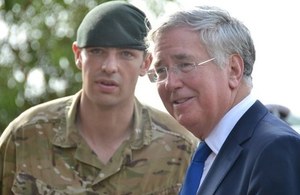Military support to the fight against Ebola comes to a close
The final military personnel deployed on Operation Gritrock have returned home to the UK.

Michael Fallon on a trip to Sierra Leone
The final eight military personnel returned home this week as the operation came to its formal end. Over 1,500 British military personnel deployed to Sierra Leone to help oversee the construction of six UK funded treatment centres from scratch and trained over 4,000 Sierra Leonean and international health care workers.
Running from early September 2014, the 14 month operation saw a range of military personnel involved. Around 70 Royal Engineers deployed to design, oversee and support the construction of the Kerry Town Treatment Unit, other Ebola Treatment Centres and the Ebola Training Academy. Over 100 clinicians drawn from across the Defence Medical Services to provide medical support in the 20 bed Ebola Treatment Unit at Kerry Town.
RFA Argus and her three Merlin helicopters from 820 Naval Air Squadron and detachment of Royal Marines from 1 Assault Group Royal Marines played a vital role, providing much-needed equipment, supplies and food packages to remote areas of Sierra Leone.
Defence Secretary Michael Fallon said:
The work of more than 1,500 of our servicemen and women has made the crucial difference in the battle against this deadly disease. For more than a year they showed immense bravery and dedication in extremely tough conditions. They are a credit to our nation, they have saved a country.
Despite being declared Ebola free, the UK response continues to ensure a ‘resilient zero’. Post-Ebola, it is essential that we ensure the Sierra Leone has the capabilities, systems, and structures in place to respond to a future outbreak of Ebola or other public health emergency. This is being done through Ebola vaccines, reducing the risk of survivors transmitting to others and helping the country recover from the impact of the long battle.